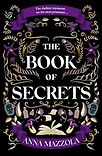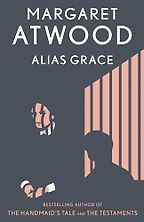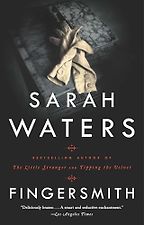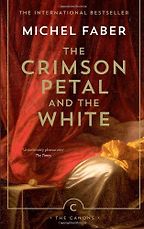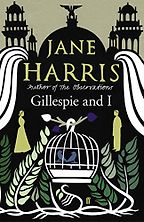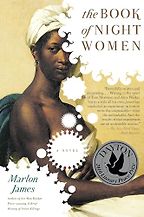What is it about historical crime novels that attracts you, as a writer and as a reader?
I never consciously set out to write historical fiction or historical crime. I realised that those are the novels that I most love, but considered in the broader sense of historical crime in that they’re set in the past and they involve crimes of some kind—that doesn’t necessarily have to be murder. Often, when people think of historical crime they think of ‘murdery detective series set in the past’. Those books are historical crime, of course, but the genre is wider. The books I have chosen essentially explore the impact of certain crimes, be that fraud or sexual violence, because I think it’s an interesting way to look at how we live our lives and how society works in a particular era. The books I’ve chosen are great crime novels, but they are also just great works of fiction.
As an author, what can you do with a historical crime novel that you couldn’t do if you set the story in the present?
There are various advantages for people writing crime set in the past. The first is that you don’t have to worry about DNA and forensics and mobile phones and modern technology, which frees you up in terms of your plot and your characters—I can create my own world in which the crime takes place and which the characters inhabit. The second is that looking at a historical era through the window of a crime is a particularly interesting way of exploring that society. How we treat the victims and how we treat the defendants tells us a lot about society at any particular time. I think that’s why I find those books so interesting, and why I’ve ended up writing them myself.
Let’s move on to your first book recommendation, Margaret Atwood’s award-winning Alias Grace, which is based on a real crime that took place in 19th-century Canada. Can you tell me why you have chosen this novel?
This is the book that has had more impact on my career than any other. It was the book that I myself wanted to write, essentially, and I’ve read it five times. It’s a fictionalised account of Grace Marks, a 16-year-old Canadian girl who was convicted as part of the murder of her employer. It explores whether Grace is guilty, whether she’s evil, whether she’s insane, or whether she is simply a victim of circumstance. Throughout the novel, she remains an enigma.
What I find so extraordinary about this story is that Margaret Atwood didn’t deviate from the historical record so far as it existed. She says in the afterword to the book that where there were gaps in the record she felt free to invent, but generally she kept to the actual story, and yet she has managed to create something which is open-ended, hugely entertaining, and compelling—that’s why it was made into a Netflix series. It’s what I set out to do in my debut novel, The Unseeing. The novel I ended up with is very different, but Alias Grace has been the most important book in instructing me on how to write and what I want to write.
Does this novel make the reader question the relationship between fact and fiction?
I think so. If you’re writing in the crime genre today, you are expected to fill certain expectations, because readers are very savvy. They read a lot of crime fiction, they’ll be expecting twists, they’ll be expecting red herrings, they’ll be expecting certain aspects of the genre. Margaret Atwood doesn’t really do any of that—because she didn’t think she was writing a crime novel, she thought she was writing a Margaret Atwood novel. And yet the book is utterly fascinating and compelling. I think that is a real skill.
Your next pick is Fingersmith by Sarah Waters, which won the Crime Writers’ Association‘s Historical Dagger award in 2002. Can you introduce it?
I could have included any of Sarah Waters’ books here—they’re all extraordinary—but Fingersmith has remained my favourite because it’s a glorious mystery, it has a fantastic, gripping plot, and also one of the best twists in the business. Obviously, I can’t give away what that is, but the structure of it is just brilliant. It’s set in Borough in South London in 1862 and it follows the life of Sue Trinder, who is a thief—or a ‘fingersmith’—from a criminal family. She is drawn into an elaborate scheme to dupe a lonely young heiress called Maud Lily out of her inheritance. But when Sue meets Maud, the story begins to change. Although she knows she can’t abandon the plan, she also doesn’t want to carry it out, and both Sue and Maud find themselves caught up in something far greater. And it’s also about erotica and Victorian porn, which is great fun.
It’s historical fiction, but you forget it’s historical fiction—the people come throbbing off the page. It’s so visceral and real. Sarah Waters manages to create these amazing Victorian characters, but she makes them fresh and new, and I think that is a real achievement in a historical novel. It’s a thriller, but it’s also a love story, and it’s modern. So we get the gloves and the stockings and the rustling skirts, but it also feels very up close and new. And she uses the vernacular of 19th century London to create a very original and striking voice for Sue Trinder.
Is there something about Victorian Britain that lends itself especially well to historical crime fiction?
I don’t know. The advantage of writing about Victorian Britain is that it’s very well documented, as I realised when I was writing The Unseeing. There are huge amounts of court records, records of what the prisons were like, what society was like and what people were thinking and doing, and there is so much amazing fiction set in that era as well, and—of course—Dickens. So, in a way, it’s easier than other eras and places to construct, which may be why there’s so much of it. But it also means that writers have to do something fresh when they present it, otherwise it can feel a bit rehearsed.
Can we talk about putting women in asylums, or is that too much of a spoiler?
I think we can talk about that. Sue and Maud have various adventures over the course of the novel, in which Sarah Waters uses some of the Victorian clichés, like women in asylums. It’s absolutely something that happened, it was a way of dealing with women who society didn’t want hanging around and who were inconvenient. But it is also a cliché in the sense that if you read any historical novel set in Victorian England, it will almost certainly feature a lunatic asylum. In this novel she makes it original—it becomes about an escape from a lunatic asylum, it becomes fun. I think Sarah Waters is brilliant, and I want her to publish another one.
Next up is The Crimson Petal and the White, an acclaimed and best-selling novel by Michel Faber. Why have you included it on your list of historical crime novels, and what is it about?
This goes back to my own notion of a crime novel: that it doesn’t have to be a detective novel or involve a murder in order to be crime fiction. The Crimson Petal and the White deals with prostitution, and it deals with fraud, and it deals with sexual violence—it involves lots of crime, so I would say it is a historical crime novel. The whole premise of the novel, which is set in this fabulously constructed 1870s London, is that Sugar—a witty, smart, resourceful prostitute—enters into a relationship with bumbling perfumier William Rackham as a means to try and trick him to use his wealth to escape her situation. Rackham is married to Agnes, who is this Victorian ideal of femininity, but she has been kept completely in the dark on sexual matters to the extent that she doesn’t know that she has a daughter, or supposedly doesn’t know, and everyone treats her as a mentally ill patient. When William eventually moves Sugar into his household and makes her a governess to his daughter, it all becomes far more complex and emotionally wrought.
It’s a very dark, vivacious, funny, and surprising novel. It’s got an original style of narration that is brilliantly done. All the familiar tropes of Victorian high fiction are there: we’ve got the mad wife and the cut-above prostitute governess, but they’re presented to us with the mind and mouth of the 21st century.
Several of the characters write—novels, sermons, diaries…
Yes, it is self-referential. Sugar, the prostitute, is writing revenge fantasy against all the men who have used her over the years. Everyone is writing their own story, essentially. Michel Faber is making us very aware that this is a story, and yet we get completely absorbed by it. The novel begins with the narrator beckoning us to follow him. It’s a very engaging and unique way of telling the story.
Let’s move on to your next book recommendation, Gillespie and I by Jane Harris, which is set in the 1880s, but looking back from the 1930s, when the narrator is writing her memoir.
Gillespie and I starts in 1933 when Harriet Baxter, an elderly English woman, is writing about an artist that she describes as a forgotten genius. We know that she lives alone in Bloomsbury with two lovebirds for company. Her story takes us back to 1888 and to the International Exhibition in Glasgow, where Harriet makes the acquaintance of the Gillespie family. As the narrative progresses, we realise that Harriet is not what she had initially seemed, and the second half of the book is taken up with a criminal trial.
What kind of narrator is she?
It’s an incredible narratorial voice, which lures us in and tricks us. It tells us a story which, on the surface, is just a nice old lady narrating her memoirs, but which transpires to be something far, far darker. The really clever thing about this novel is that it was not marketed as a crime novel and, when I started reading it, I did not realise it was a crime novel. The way that is done is masterful. The Observations by Jane Harris has also got an incredible narrator who has a very different voice, but again very original and fresh.
We have come to your final pick, The Book of Night Women by Booker Prize-winning author Marlon James. Of the books you have chosen, this is set furthest back in time, taking us to late 18th-century Jamaica. Please introduce it, and tell us why you have included it among your historical crime novel recommendations.
This is Marlon James’ second novel, and it’s set on a Jamaican sugar plantation. It tells the story of Lilith, who is born into slavery and orphaned at birth by her 13-year-old mother. She’s one of the many slave girls raped by the white masters so she is, unsurprisingly, forced to grow up very fast and begins to push at the edges of what is imaginable for the life of a slave woman. It’s not an easy read, but it is an incredible story. Again, it’s got the most astonishing narrative voice, where the rhythms of her speech really come through. Marlon James’ use of Jamaican patois always feels very strong and has its own internal rhythm.
The novel is not just about Lilith, it’s about six half sisters—or ‘night women’—who are all the product of rape and who form a clandestine sisterhood to formulate the overthrow of their white oppressors. He manages to weave Lilith’s narrative together with others’ in a way that is neither derivative or contrived. It’s probably a story that some people might say is not historical crime, in that it is not a murder mystery, but it starts with the product of rape and it is the story of abuse and slavery and resilience. It’s a very powerful novel, and—again—one that has a memorable, unique voice.
Do you think that different historical time periods enable a different interaction between the setting, action and psychology?
My own novels are set all over the place, both historically and geographically, and each era and place that I’ve worked in has definitely had a different view of society and a different mindset. That becomes part of the work, because you can’t render a time accurately without showing what people were thinking, and what their moral codes were. When I was writing about 18th-century Paris for The Clockwork Girl, what struck me very much when I was reading about the era was the stark breach between the rich and the poor and the prejudices that existed against the poor, so that then became a key part of the novel, which is partly about the value of human life. So, yes, I think each era has its own belief systems, and they will inevitably become part of the novel.
Do you want to talk a little bit about your own most recent novel, The Book of Secrets, which won the Crime Writers’ Association’s Gold Dagger award for crime novel of the year in 2025?
The Book of Secrets is based on a real case from 1659 in Rome, called the ‘Spana Prosecution’, where a group of women were investigated and prosecuted for making and selling poison to other women, mainly to do away with nasty husbands, and some fathers and brothers. I’ve made it a sort of cat and mouse game between Girolama, the woman at the centre of the web, and Stefano Bracchi, who was the real investigating judge responsible for getting to the truth. And there is a third woman, Anna Conti, who is in an abusive marriage and is working out how to escape. It’s not a murder mystery detective novel in that we know fairly early what’s going on. What we don’t know is who is going to survive, who is going to succeed, and who we will want to root for.
You have another job as a criminal justice solicitor. How does that inform your writing?
I work for the Centre for Women’s Justice as a consultant, doing work with survivors, trying to get the police or Crown Prosecution Service to take action. So I see a lot of injustice and unfairness and a lot of abusive men who are never properly dealt with, particularly men in positions of power. That inevitably comes through in my writing. It was why I was particularly interested in the Girolama Spana case. It’s why my latest modern Anna Sharpe novel, Notes on a Drowning, is a legal thriller about men in positions of power abusing that power. We write about the things we care about, don’t we? I never use real cases, but some of the anger that comes from my work goes into my writing.
Is there anything that you want to add?
When I look at the books I’ve chosen, I realise that they are all about women who have great agency within the novel, despite their constraints. They’re all narrated with a very distinctive and clear voice. In Alias Grace, for example, we have Grace herself, who is a very smart, sly character who uses the most incredible imagery. When I think back on that book, I don’t just remember the words, I remember the pictures. With each of these novels, you’re immediately hooked in by the narrator and the story, and you don’t feel like you’re reading ‘historical fiction’ necessarily.
All the novels I’ve mentioned reflect what the era was truly like, but they also resonate because they have quite a modern take on themes explored.
I also want to say that it was extremely hard to decide on this selection, because there are so many other books that could have gone on this list. I didn’t include Thomas Harris or Maria McCann or Andrew Taylor or so many other of my favourites—there are so many that could have been included. It’s a very rich genre, especially if you interpret it widely. It’s been a lovely process for me to go through and think about which historical crime novels have been my favourites, and why.
Interview by Tuva Kahrs
September 28, 2025. Updated: September 29, 2025
Five Books aims to keep its book recommendations and interviews up to date. If you are the interviewee and would like to update your choice of books (or even just what you say about them) please email us at [email protected]
Five Books interviews are expensive to produce. If you've enjoyed this interview, please support us by donating a small amount.

